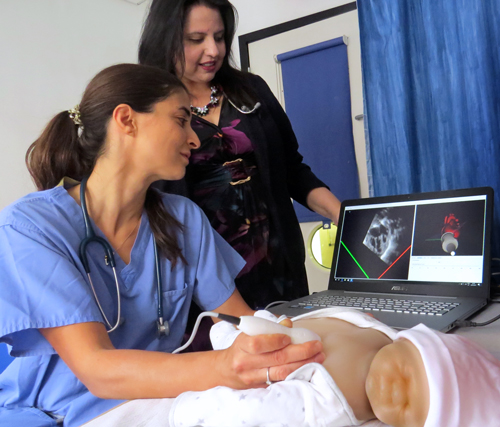A bespoke simulation doll that can 'learn' heart conditions has been produced to train doctors to detect life-threatening conditions in babies.
 Paediatric cardiologist Dr Nitha Naqvi came across the innovative prototype on the internet and was so inspired by its potential that she flew to Leipzig, Germany, to ask the inventor, Dr Michael Weidenbach, to make one especially for the Trust.
Paediatric cardiologist Dr Nitha Naqvi came across the innovative prototype on the internet and was so inspired by its potential that she flew to Leipzig, Germany, to ask the inventor, Dr Michael Weidenbach, to make one especially for the Trust.
The doll, named SOPHIA, has been programmed with information about many serious congenital heart problems, such as hypoplastic left heart (a condition with an under-developed small left pumping chamber), and has the potential to "learn" new conditions.
Dr Naqvi said: "The system has been created by storing images of numerous real babies with congenital heart disease, and as such it provides the opportunity for diagnostic training on an entirely new level.
"Getting to scan the full range of congenital heart conditions in patients typically takes trainees years to accomplish, but this doll can provide realistic simulations of these conditions in just a few hours."
"We are thrilled to be one of the first in the world to have this doll."
Dr Nitha Naqvi
The baby was Dr Weidenbach's life work and he was originally reluctant to make any more. However, Dr Naqvi invited him to visit the Trust and see some of the congenital heart disease (CHD) team's outstanding work in research, education and patient care. Following this visit, he agreed to create a fully-produced model for the Trust - a process that took several years and cost £26,000. It was funded with the help of the Friends of Royal Brompton charity.
Dr Naqvi added: "I cannot thank the charity enough for their help. We are thrilled to be one of the first in the world to have this doll."
The CHD team has already used the doll to help share knowledge outside the Trust. Forty doctors from around the world visited Royal Brompton for a specialist training day, learning how to scan and identify different paediatric heart conditions in one afternoon.
